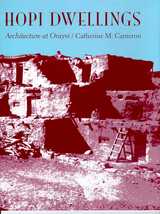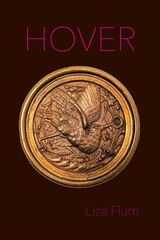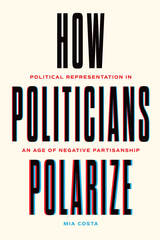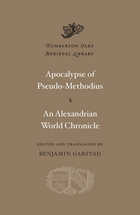

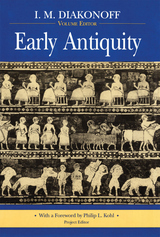
M. Diakonoff has gathered the work of Soviet historians in
this survey of the earliest history of the ancient Near East,
Central Asia, India, and China. Diakonoff and his
colleagues, nearly all working within the general Marxist
historiographic tradition, offer a comprehensive, accessible
synthesis of historical knowledge from the beginnings of
agriculture through the advent of the Iron Age and the Greek
colonization in the Mediterranean and the Black Sea areas.
Besides discussing features of Soviet historical
scholarship of the ancient world, the essays treat the
history of early Mesopotamia and the course of Pharaonic
Egyptian civilization and developments in ancient India and
China from the Bronze Age into the first millennium B.C.
Additional chapters are concerned with the early history of
Syria, Phoenicia, and Palestine, the Hittite civilization,
the Creto-Mycenaean world, Homeric Greece, and the Phoenician
and Greek colonization.
This volume offers a unified perspective on early
antiquity, focusing on the economic and social relations of
production. Of immense value to specialists, the book will
also appeal to general readers.
I. M. Diakonoff is a senior research scholar of ancient
history at the Institute of Oriental Studies, Leningrad
Academy of Sciences. Philip L. Kohl is professor of
anthropology at Wellesley College.
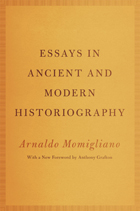
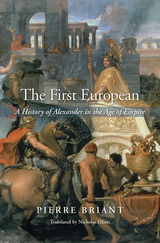
The exploits of Alexander the Great were so remarkable that for centuries after his death the Macedonian ruler seemed a figure more of legend than of history. Thinkers of the European Enlightenment, searching for ancient models to understand contemporary affairs, were the first to critically interpret Alexander’s achievements. As Pierre Briant shows, in the minds of eighteenth-century intellectuals and philosophes, Alexander was the first European: a successful creator of empire who opened the door to new sources of trade and scientific knowledge, and an enlightened leader who brought the fruits of Western civilization to an oppressed and backward “Orient.”
In France, Scotland, England, and Germany, Alexander the Great became an important point of reference in discourses from philosophy and history to political economy and geography. Voltaire, Montesquieu, and Robertson asked what lessons Alexander’s empire-building had to teach modern Europeans. They saw the ancient Macedonian as the embodiment of the rational and benevolent Western ruler, a historical model to be emulated as Western powers accelerated their colonial expansion into Asia, India, and the Middle East.
For a Europe that had to contend with the formidable Ottoman Empire, Alexander provided an important precedent as the conqueror who had brought great tyrants of the “Orient” to heel. As The First European makes clear, in the minds of Europe’s leading thinkers, Alexander was not an aggressive militarist but a civilizing force whose conquests revitalized Asian lands that had lain stagnant for centuries under the lash of despotic rulers.

For those who believe that globalization is a purely modern phenomenon, this book holds a startling and absorbing lesson. From Egypt to Babylon immerses readers in a world of exotic empires and states as they waxed and waned and interacted in a period of extraordinary internationalism—all before the rise of the Persian Empire.
The ancient Egyptians, Minoans, Mycenaeans, Hittites, Canaanites, Hurrians, Aramaeans, Israelites, Urartians, Mannaeans, Assyrians, Phrygians, Kassites, Chaldaeans, Elamites, Scythians, Medes, and Persians: these are the societies who for a millennia peopled the world from the Aegean and Egypt in the west to what we know now as Iraq and Iran in the east. In a concise introduction, illustrated with objects drawn largely from the collections of the British Museum, this book takes the reader through the vast and varied landscape of this period, where a far-flung world was linked by military expansion, diplomatic relations, and movement of goods and peoples that brought about profound cultural exchanges and technological and social revolutions. The story brings the reader from the foundations of the Egyptian empire through the turmoil at the end of the second millennium bce to the unprecedented political unification of the whole region by kings of Persia.
From Egypt to Babylon weaves together the political histories of the region’s diverse societies for the first time, tracing shifting fortunes and burgeoning colonies, trading connections and cultural pressures in what was truly the world’s first international age.
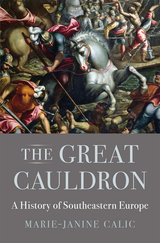
A sweeping history of southeastern Europe from antiquity to the present that reveals it to be a vibrant crossroads of trade, ideas, and religions.
We often think of the Balkans as a region beset by turmoil and backwardness, but from late antiquity to the present it has been a dynamic meeting place of cultures and religions. Combining deep insight with narrative flair, The Great Cauldron invites us to reconsider the history of this intriguing, diverse region as essential to the story of global Europe.
Marie-Janine Calic reveals the many ways in which southeastern Europe’s position at the crossroads of East and West shaped continental and global developments. The nascent merchant capitalism of the Mediterranean world helped the Balkan knights fight the Ottomans in the fifteenth century. The deep pull of nationalism led a young Serbian bookworm to spark the conflagration of World War I. The late twentieth century saw political Islam spread like wildfire in a region where Christians and Muslims had long lived side by side. Along with vivid snapshots of revealing moments in time, including Krujë in 1450 and Sarajevo in 1984, Calic introduces fascinating figures rarely found in standard European histories. We meet the Greek merchant and poet Rhigas Velestinlis, whose revolutionary pamphlet called for a general uprising against Ottoman tyranny in 1797. And the Croatian bishop Ivan Dominik Stratiko, who argued passionately for equality of the sexes and whose success with women astonished even his friend Casanova.
Calic’s ambitious reappraisal expands and deepens our understanding of the ever-changing mixture of peoples, faiths, and civilizations in this much-neglected nexus of empire.

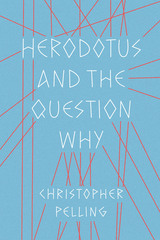
In the 5th century BCE, Herodotus wrote the first known Western history to build on the tradition of Homeric storytelling, basing his text on empirical observations and arranging them systematically. Herodotus and the Question Why offers a comprehensive examination of the methods behind the Histories and the challenge of documenting human experiences, from the Persian Wars to cultural traditions.
In lively, accessible prose, Christopher Pelling explores such elements as reconstructing the mentalities of storyteller and audience alike; distinctions between the human and the divine; and the evolving concepts of freedom, democracy, and individualism. Pelling traces the similarities between Herodotus's approach to physical phenomena (Why does the Nile flood?) and to landmark events (Why did Xerxes invade Greece? And why did the Greeks win?), delivering a fascinating look at the explanatory process itself. The cultural forces that shaped Herodotus's thinking left a lasting legacy for us, making Herodotus and the Question Why especially relevant as we try to record and narrate the stories of our time and to fully understand them.
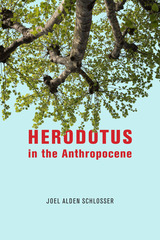
Schlosser shows that the Histories, which chronicle the interactions among the Greek city-states and their neighbors that culminated in the Persian Wars, illuminate a telling paradox: at those times when humans appear capable of exerting more influence than ever before, they must also assert collective agency to avoid their own downfall. Here, success depends on nomoi, or the culture, customs, and laws that organize human communities and make them adaptable through cooperation. Nomoi arise through sustained contact between humans and their surroundings and function best when practiced willingly and with the support of strong commitments to the equality of all participants. Thus, nomoi are the very substance of political agency and, ultimately, the key to freedom and ecological survival because they guide communities to work together to respond to challenges. An ingenious contribution to political theory, political philosophy, and ecology, Herodotus in the Anthropocene reminds us that the best perspective on the present can often be gained through the lens of the past.

In a series of brilliant snapshots, each a distinct bit of a larger story, Maurice Sartre’s Histoires Grecques spans the grand narrative of Greek culture over a thousand years and a vast expanse of land and sea. From Homer to Damascius, from recent discoveries in Kandahar to an account of the murder of Hypatia in 415 CE, each snapshot captures a moment in the history of Greek civilization. Together they offer a fresh perspective on an ancient culture whose wealth and depth of thought, variety and multiplicity of accomplishments, and astonishing continuity through time and space have made it the Western world’s culture of reference.
A textual fragment, a coin, an epigraph: each artifact and image launches Sartre—and his readers—on a journey into the practical mysteries of Greek civilization. Ranging from Afghanistan to the Mediterranean world, these excursions—step by step, moment by moment—finally amount to a panoramic vision of one of the most important civilizations of all time. Histoires Grecques shows the newcomer and the seasoned scholar alike how history itself is written—and imparts the experience, and the pleasure, of discovering history as discrete stories seen through the eyes of one of the most eminent historians of ancient Greece.

A literary cabinet of curiosities.
Aelian’s Historical Miscellany is a pleasurable example of light reading for Romans of the early third century. Offering engaging anecdotes about historical figures, retellings of legendary events, and enjoyable descriptive pieces—in sum: amusement, information, and variety—Aelian’s collection of nuggets and narratives could be enjoyed by a wide reading public. A rather similar book had been published in Latin in the previous century by Aulus Gellius; Aelian is a late, perhaps the last, representative of what had been a very popular genre.
Here then are anecdotes about the famous Greek philosophers, poets, historians, and playwrights; myths instructively retold; moralizing tales about heroes and rulers, athletes and wise men; reports about styles in dress, food and drink, lovers, gift-giving practices, entertainments, religious beliefs and death customs; and comments on Greek painting. Some of the information is not preserved in any other source. Underlying it all are Aelian’s Stoic ideals as well as this Roman’s great admiration for the culture of the Greeks (whose language he borrowed for his writings).
The Historical Miscellany is now added to the Loeb Classical Library, the Greek text facing a skillful and helpfully annotated new translation by Nigel Wilson. In his trenchant Introduction he discusses the literary genre of Aelian’s miscellany, its style and historical setting.

Hellenistic history.
The historian Polybius (ca. 200–118 BC) was born into a leading family of Megalopolis in the Peloponnese (Morea) and served the Achaean League in arms and diplomacy for many years, favoring alliance with Rome. From 168 to 151 he was held hostage in Rome, where he became a friend of Lucius Aemilius Paulus and his two sons, especially Scipio Aemilianus, whose campaigns, including the destruction of Carthage, he later attended. Late in his life he became a trusted mediator between Greece and the Romans; helped in the discussions that preceded the final war with Carthage; and after 146 was entrusted by the Romans with the details of administration in Greece.
Polybius’ overall theme is how and why the Romans spread their power as they did. The main part of his history covers the years 264–146 BC, describing the rise of Rome, her destruction of Carthage, and her eventual domination of the Greek world. It is a great work: accurate, thoughtful, largely impartial, based on research, and full of insight into customs, institutions, geography, the causes of events, and the character of peoples. It is a vital achievement of the first importance despite the incomplete state in which all but the first five of its original forty books have reached us.
For this edition, W. R. Paton’s excellent translation, first published in 1922, has been thoroughly revised, the Büttner-Wobst Greek text corrected, and explanatory notes and a new introduction added, all reflecting the latest scholarship.
The Loeb Classical Library edition of Polybius is in six volumes.

Hellenistic history.
The historian Polybius (ca. 200–118 BC) was born into a leading family of Megalopolis in the Peloponnese (Morea) and served the Achaean League in arms and diplomacy for many years, favoring alliance with Rome. From 168 to 151 he was held hostage in Rome, where he became a friend of Lucius Aemilius Paulus and his two sons, especially Scipio Aemilianus, whose campaigns, including the destruction of Carthage, he later attended. Late in his life he became a trusted mediator between Greece and the Romans; helped in the discussions that preceded the final war with Carthage; and after 146 was entrusted by the Romans with the details of administration in Greece.
Polybius’ overall theme is how and why the Romans spread their power as they did. The main part of his history covers the years 264–146 BC, describing the rise of Rome, her destruction of Carthage, and her eventual domination of the Greek world. It is a great work: accurate, thoughtful, largely impartial, based on research, and full of insight into customs, institutions, geography, the causes of events, and the character of peoples. It is a vital achievement of the first importance despite the incomplete state in which all but the first five of its original forty books have reached us.
For this edition, W. R. Paton’s excellent translation, first published in 1922, has been thoroughly revised, the Büttner-Wobst Greek text corrected, and explanatory notes and a new introduction added, all reflecting the latest scholarship.
The Loeb Classical Library edition of Polybius is in six volumes.
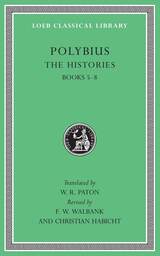
Hellenistic history.
The historian Polybius (ca. 200–118 BC) was born into a leading family of Megalopolis in the Peloponnese (Morea) and served the Achaean League in arms and diplomacy for many years, favoring alliance with Rome. From 168 to 151 he was held hostage in Rome, where he became a friend of Lucius Aemilius Paulus and his two sons, especially Scipio Aemilianus, whose campaigns, including the destruction of Carthage, he later attended. Late in his life he became a trusted mediator between Greece and the Romans; helped in the discussions that preceded the final war with Carthage; and after 146 was entrusted by the Romans with the details of administration in Greece.
Polybius’ overall theme is how and why the Romans spread their power as they did. The main part of his history covers the years 264–146 BC, describing the rise of Rome, her destruction of Carthage, and her eventual domination of the Greek world. It is a great work: accurate, thoughtful, largely impartial, based on research, and full of insight into customs, institutions, geography, the causes of events, and the character of peoples. It is a vital achievement of the first importance despite the incomplete state in which all but the first five of its original forty books have reached us.
For this edition, W. R. Paton’s excellent translation, first published in 1922, has been thoroughly revised, the Büttner-Wobst Greek text corrected, and explanatory notes and a new introduction added, all reflecting the latest scholarship.
The Loeb Classical Library edition of Polybius is in six volumes.
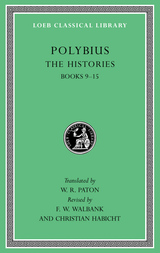
Hellenistic history.
The historian Polybius (ca. 200–118 BC) was born into a leading family of Megalopolis in the Peloponnese (Morea) and served the Achaean League in arms and diplomacy for many years, favoring alliance with Rome. From 168 to 151 he was held hostage in Rome, where he became a friend of Lucius Aemilius Paulus and his two sons, especially Scipio Aemilianus, whose campaigns, including the destruction of Carthage, he later attended. Late in his life he became a trusted mediator between Greece and the Romans; helped in the discussions that preceded the final war with Carthage; and after 146 was entrusted by the Romans with the details of administration in Greece.
Polybius’ overall theme is how and why the Romans spread their power as they did. The main part of his history covers the years 264–146 BC, describing the rise of Rome, her destruction of Carthage, and her eventual domination of the Greek world. It is a great work: accurate, thoughtful, largely impartial, based on research, and full of insight into customs, institutions, geography, the causes of events, and the character of peoples. It is a vital achievement of the first importance despite the incomplete state in which all but the first five of its original forty books have reached us.
For this edition, W. R. Paton’s excellent translation, first published in 1922, has been thoroughly revised, the Büttner-Wobst Greek text corrected, and explanatory notes and a new introduction added, all reflecting the latest scholarship.
The Loeb Classical Library edition of Polybius is in six volumes.
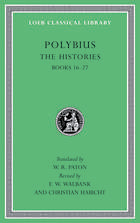
Hellenistic history.
The historian Polybius (ca. 200–118 BC) was born into a leading family of Megalopolis in the Peloponnese (Morea) and served the Achaean League in arms and diplomacy for many years, favoring alliance with Rome. From 168 to 151 he was held hostage in Rome, where he became a friend of Lucius Aemilius Paulus and his two sons, especially Scipio Aemilianus, whose campaigns, including the destruction of Carthage, he later attended. Late in his life he became a trusted mediator between Greece and the Romans; helped in the discussions that preceded the final war with Carthage; and after 146 was entrusted by the Romans with the details of administration in Greece.
Polybius’ overall theme is how and why the Romans spread their power as they did. The main part of his history covers the years 264–146 BC, describing the rise of Rome, her destruction of Carthage, and her eventual domination of the Greek world. It is a great work: accurate, thoughtful, largely impartial, based on research, and full of insight into customs, institutions, geography, the causes of events, and the character of peoples. It is a vital achievement of the first importance despite the incomplete state in which all but the first five of its original forty books have reached us.
For this edition, W. R. Paton’s excellent translation, first published in 1922, has been thoroughly revised, the Büttner-Wobst Greek text corrected, and explanatory notes and a new introduction added, all reflecting the latest scholarship.
The Loeb Classical Library edition of Polybius is in six volumes.
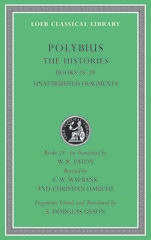
Hellenistic history.
The historian Polybius (ca. 200–118 BC) was born into a leading family of Megalopolis in the Peloponnese (Morea) and served the Achaean League in arms and diplomacy for many years, favoring alliance with Rome. From 168 to 151 he was held hostage in Rome, where he became a friend of Lucius Aemilius Paulus and his two sons, especially Scipio Aemilianus, whose campaigns, including the destruction of Carthage, he later attended. Late in his life he became a trusted mediator between Greece and the Romans; helped in the discussions that preceded the final war with Carthage; and after 146 was entrusted by the Romans with the details of administration in Greece.
Polybius’ overall theme is how and why the Romans spread their power as they did. The main part of his history covers the years 264–146 BC, describing the rise of Rome, her destruction of Carthage, and her eventual domination of the Greek world. It is a great work: accurate, thoughtful, largely impartial, based on research, and full of insight into customs, institutions, geography, the causes of events, and the character of peoples. It is a vital achievement of the first importance despite the incomplete state in which all but the first five of its original forty books have reached us.
For this edition, W. R. Paton’s excellent translation, first published in 1922, has been thoroughly revised, the Büttner-Wobst Greek text corrected, and explanatory notes and a new introduction added, all reflecting the latest scholarship.
The Loeb Classical Library edition of Polybius is in six volumes.
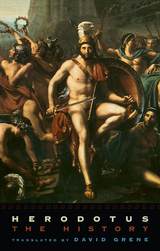
Here is the historian, investigating and judging what he has seen, heard, and read, and seeking out the true causes and consequences of the great deeds of the past. In his History, the war between the Greeks and Persians, the origins of their enmity, and all the more general features of the civilizations of the world of his day are seen as a unity and expressed as the vision of one man who as a child lived through the last of the great acts in this universal drama.
In Grene's remarkable translation and commentary, we see the historian as a storyteller, combining through his own narration the skeletal "historical" facts and the imaginative reality toward which his story reaches. Herodotus emerges in all his charm and complexity as a writer and the first historian in the Western tradition, perhaps unique in the way he has seen the interrelation of fact and fantasy.
"Reading Herodotus in English has never been so much fun. . . . Herodotus crowds his fresco-like pages with all shades of humanity. Whether Herodotus's view is 'tragic,' mythical, or merely common sense, it provided him with a moral salt with which the diversity of mankind could be savored. And savor it we do in David Grene's translation."—Thomas D'Evelyn, Christian Science Monitor
"Grene's work is a monument to what translation intends, and to what it is hungry to accomplish. . . . Herodotus gives more sheer pleasure than almost any other writer."—Peter Levi, New York Times Book Review
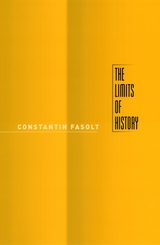
So argues Constantin Fasolt in The Limits of History, an ambitious and pathbreaking study that conquers history's power by carrying the fight into the center of its domain. Fasolt considers the work of Hermann Conring (1606-81) and Bartolus of Sassoferrato (1313/14-57), two antipodes in early modern battles over the principles of European thought and action that ended with the triumph of historical consciousness. Proceeding according to the rules of normal historical analysis—gathering evidence, putting it in context, and analyzing its meaning—Fasolt uncovers limits that no kind of history can cross. He concludes that history is a ritual designed to maintain the modern faith in the autonomy of states and individuals. God wants it, the old crusaders would have said. The truth, Fasolt insists, only begins where that illusion ends.
With its probing look at the ideological underpinnings of historical practice, The Limits of History demonstrates that history presupposes highly political assumptions about free will, responsibility, and the relationship between the past and the present. A work of both intellectual history and historiography, it will prove invaluable to students of historical method, philosophy, political theory, and early modern European culture.
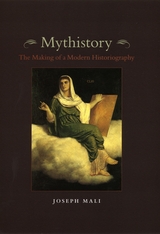
In Mythistory, Joseph Mali revives this oldest controversy in historiography. Contesting the conventional opposition between myth and history, Mali advocates instead for a historiography that reconciles the two and recognizes the crucial role that myth plays in the construction of personal and communal identities. The task of historiography, he argues, is to illuminate, not eliminate, these fictions by showing how they have passed into and shaped historical reality. Drawing on the works of modern theorists and artists of myth such as Nietzsche and Wittgenstein, Joyce and Eliot, Mali redefines modern historiography and relates it to the older notion and tradition of "mythistory."
Tracing the origins and transformations of this historiographical tradition from the ancient world to the modern, Mali shows how Livy and Machiavelli sought to recover true history from uncertain myth-and how Vico and Michelet then reversed this pattern of inquiry, seeking instead to recover a deeper and truer myth from uncertain history. In the heart of Mythistory, Mali turns his attention to four thinkers who rediscovered myth in and for modern cultural history: Jacob Burckhardt, Aby Warburg, Ernst Kantorowicz, and Walter Benjamin. His elaboration of the different biographical and historiographical routes by which all four sought to account for the persistence and significance of myth in Western civilization opens up new perspectives for an alternative intellectual history of modernity-one that may better explain the proliferation of mythic imageries of redemption in our secular, all too secular, times.
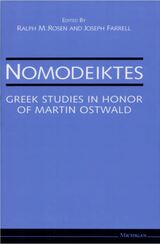
Nomodeiktes: Greek Studies in Honor of Martin Ostwald offers fascinating discussions of many of these areas, and it helps illuminate ways in which modern perceptions of this complex period are right and are wrong. Important observations are made on Greek historians and historiography, on politics and society, and on Greek philosophy and literature. The analyses of these major areas of investigation will be very useful for all interested in this centrally important period and for those who know the lure of that vivid and compelling city, Athens.


The “Father of History.”
Herodotus the great Greek historian was born about 484 BC, at Halicarnassus in Caria, Asia Minor, when it was subject to the Persians. He traveled widely in most of Asia Minor, Egypt (as far as Aswan), North Africa, Syria, the country north of the Black Sea, and many parts of the Aegean Sea and the mainland of Greece. He lived, it seems, for some time in Athens, and in 443 went with other colonists to the new city Thurii (in South Italy), where he died about 430. He was “the prose correlative of the bard, a narrator of the deeds of real men, and a describer of foreign places” (Murray).
Herodotus’ famous history of warfare between the Greeks and the Persians has an epic dignity which enhances his delightful style. It includes the rise of the Persian power and an account of the Persian empire; a description and history of Egypt; and a long digression on the geography and customs of Scythia. Even in the later books on the attacks of the Persians against Greece there are digressions. All is most entertaining and produces a grand unity. After personal inquiry and study of hearsay and other evidence, Herodotus gives us a not uncritical estimate of the best that he could find.
The Loeb Classical Library edition of Herodotus is in four volumes.

The “Father of History.”
Herodotus the great Greek historian was born about 484 BC, at Halicarnassus in Caria, Asia Minor, when it was subject to the Persians. He traveled widely in most of Asia Minor, Egypt (as far as Aswan), North Africa, Syria, the country north of the Black Sea, and many parts of the Aegean Sea and the mainland of Greece. He lived, it seems, for some time in Athens, and in 443 went with other colonists to the new city Thurii (in South Italy), where he died about 430. He was “the prose correlative of the bard, a narrator of the deeds of real men, and a describer of foreign places” (Murray).
Herodotus’ famous history of warfare between the Greeks and the Persians has an epic dignity which enhances his delightful style. It includes the rise of the Persian power and an account of the Persian empire; a description and history of Egypt; and a long digression on the geography and customs of Scythia. Even in the later books on the attacks of the Persians against Greece there are digressions. All is most entertaining and produces a grand unity. After personal inquiry and study of hearsay and other evidence, Herodotus gives us a not uncritical estimate of the best that he could find.
The Loeb Classical Library edition of Herodotus is in four volumes.

The “Father of History.”
Herodotus the great Greek historian was born about 484 BC, at Halicarnassus in Caria, Asia Minor, when it was subject to the Persians. He traveled widely in most of Asia Minor, Egypt (as far as Aswan), North Africa, Syria, the country north of the Black Sea, and many parts of the Aegean Sea and the mainland of Greece. He lived, it seems, for some time in Athens, and in 443 went with other colonists to the new city Thurii (in South Italy), where he died about 430. He was “the prose correlative of the bard, a narrator of the deeds of real men, and a describer of foreign places” (Murray).
Herodotus’ famous history of warfare between the Greeks and the Persians has an epic dignity which enhances his delightful style. It includes the rise of the Persian power and an account of the Persian empire; a description and history of Egypt; and a long digression on the geography and customs of Scythia. Even in the later books on the attacks of the Persians against Greece there are digressions. All is most entertaining and produces a grand unity. After personal inquiry and study of hearsay and other evidence, Herodotus gives us a not uncritical estimate of the best that he could find.
The Loeb Classical Library edition of Herodotus is in four volumes.

The “Father of History.”
Herodotus the great Greek historian was born about 484 BC, at Halicarnassus in Caria, Asia Minor, when it was subject to the Persians. He traveled widely in most of Asia Minor, Egypt (as far as Aswan), North Africa, Syria, the country north of the Black Sea, and many parts of the Aegean Sea and the mainland of Greece. He lived, it seems, for some time in Athens, and in 443 went with other colonists to the new city Thurii (in South Italy), where he died about 430. He was “the prose correlative of the bard, a narrator of the deeds of real men, and a describer of foreign places” (Murray).
Herodotus’ famous history of warfare between the Greeks and the Persians has an epic dignity which enhances his delightful style. It includes the rise of the Persian power and an account of the Persian empire; a description and history of Egypt; and a long digression on the geography and customs of Scythia. Even in the later books on the attacks of the Persians against Greece there are digressions. All is most entertaining and produces a grand unity. After personal inquiry and study of hearsay and other evidence, Herodotus gives us a not uncritical estimate of the best that he could find.
The Loeb Classical Library edition of Herodotus is in four volumes.

As 21st-century citizens of developed countries, we are constantly bombarded by numbers in every aspect of our lives. Almost automatically, we learn to interpret how numbers are used in our language, what magnitude of numbers we expect to hear in particular contexts, how people in our community express degrees of confidence in the reliability of any particular number, etc. Context of this kind is lacking when we read a historical narrative composed in an ancient language, from a world vastly different from ours. In Quantifying Mentalities, Catherine Rubincam helps overcome this barrier to our accurate understanding of the numbers in the works of five major ancient Greek historians by providing a standard against which their credibility can be more accurately judged.
This systematic, quantified study is based on the compilation of statistics concerning a standard constellation of aspects of all the numbers in the historical works of the five earliest wholly or at least substantially surviving ancient Greek historians: Herodotus, Thucydides, Xenophon (Anabasis and Hellenica), Polybius, and Diodorus Siculus. Such a comprehensive study has not been attempted before. For scholars reading and writing about the history of ancient Greece the volume offers a tool for interpreting the numbers in these ancient texts with more sensitivity to the world in which they were written. Standard aspects of number use captured by the coding system are: the different types of number (cardinals, ordinals, compounds, and non-explicit but definite numbers); the subject category to which each number belongs (Time, Distance-Size, Military, Population, Money, and Miscellaneous); and the types of any qualifications attached to it (Approximating, Comparative, Alternative, and Emphatic). The statistics also facilitate comparisons of every aspect of number use between authors and texts, enabling the delineation of a numeric profile for each one. This allows us to read these texts with a greater sensitivity to how they might have sounded to the author and his original readers, thus providing a firmer foundation for reconstructing or interpreting ancient Greek history.
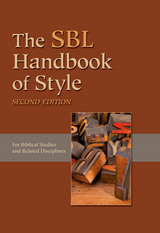
The definitive source for how to write and publish in the field of biblical studies
The long-awaited second edition of the essential style manual for writing and publishing in biblical studies and related fields includes key style changes, updated and expanded abbreviation and spelling-sample lists, a list of archaeological site names, material on qur’anic sources, detailed information on citing electronic sources, and expanded guidelines for the transliteration and transcription of seventeen ancient languages.
Features:
- Expanded lists of abbreviations for use in ancient Near Eastern, biblical, and early Christian studies
- Information for transliterating seventeen ancient languages
- Exhaustive examples for citing print and electronic sources
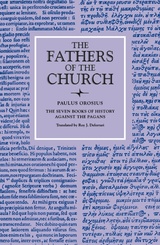
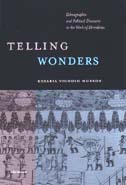
As he explores the causes of the East-West conflict from its most remote antecedents, Herodotus includes conflicting traditions about different historical periods as well as apparently tangential descriptions of the customs of faraway peoples. What was his aim in combining such diverse material? Rosaria Vignolo Munson argues that Herodotus' aim was two-fold: to use historical narrative to illuminate the present and to describe barbarian customs so that the Greeks might understand themselves.
Herodotus assumes the role of advisor to his audience, acting as a master of metaphor and oracular speech and as an intellectual fully aware of new philosophical and political trends. By comparing, interpreting, and evaluating facts through time and space or simply by pointing them out as objects of "wonder," he teaches that correct political action is linked to an appropriate approach to foreigners and additional "others." Munson relies on traditional scholarship and modern studies in narratology and related critical fields to distinguish between narrative and metanarrative, providing a framework for analyzing the construction of Herodotus' discourse and his presentation of himself through it.
Munson's work will be useful to classicists and ancient historians and will also engage anthropologists interested in cultural interaction and notions of ethnicity and literary critics interested in narrative constructions.
READERS
Browse our collection.
PUBLISHERS
See BiblioVault's publisher services.
STUDENT SERVICES
Files for college accessibility offices.
UChicago Accessibility Resources
home | accessibility | search | about | contact us
BiblioVault ® 2001 - 2025
The University of Chicago Press


